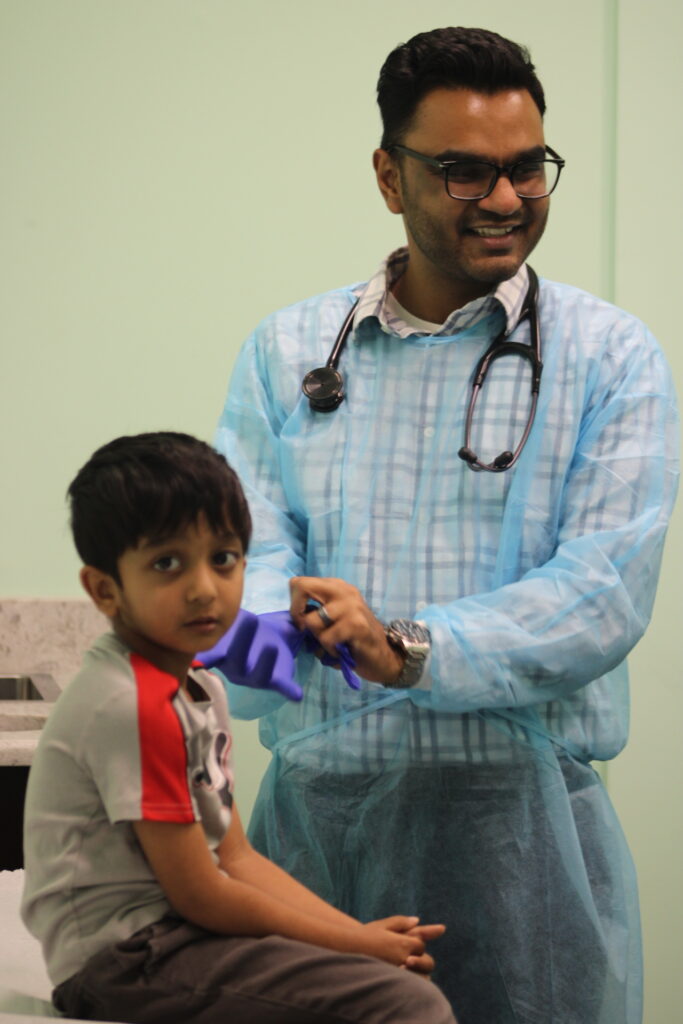
Meningococcal disease is a serious and potentially life-threatening illness caused by the bacteria Neisseria meningitidis. There are several groups of this bacteria, but one of the most common in the United States is serogroup B, or Meningitis B.
This illness can lead to two major health problems:
An infection of the lining of the brain and spinal cord.
A bloodstream infection.
Meningitis B can progress very quickly, often with symptoms that initially mimic the flu, such as fever, headache, and fatigue. However, it can rapidly worsen, leading to severe complications like brain damage, hearing loss, limb amputations, and even death, sometimes within 24 hours of the first symptoms.
While meningococcal disease is relatively rare, its consequences are devastating. Adolescents and young adults, particularly those living in close quarters like college dorms, are at an increased risk. The disease spreads through respiratory and throat secretions (saliva or spit), which means activities like coughing, sneezing, kissing, or sharing drinks can transmit the bacteria.
For years, a standard meningococcal vaccine (MenACWY) has been part of the routine childhood immunization schedule. This vaccine protects against four major serogroups: A, C, W, and Y. However, it does not protect against serogroup B.
The development of the Meningitis B vaccine was a significant breakthrough. It specifically targets the B strain, closing a critical gap in protection for our children. Vaccinating against Meningitis B is the most effective way to prevent this specific type of meningococcal disease.
The Centers for Disease Control and Prevention (CDC) has specific recommendations for the Meningitis B vaccine. The decision is based on a concept called “shared clinical decision-making.” This means you and your pediatrician should discuss the risks and benefits to decide if the vaccine is right for your child.
The preferred age range for vaccination is 16 to 18 years old, as this provides protection before many young adults enter high-risk environments like college.
Certain individuals are at a higher risk and are strongly recommended to receive the vaccine. This group includes people who:
Your provider at Colonia Pediatrics can help you understand your child’s specific risk factors and make the best decision for their health.
In the United States, there are two licensed Meningitis B vaccines: Bexsero® and Trumenba®. These two vaccines are not interchangeable; whichever one your child starts with is the one they should complete the series with.
The schedule depends on the vaccine used:
1. Bexsero®:
Given as a two-dose series. The doses should be administered at least one month apart.
2. Trumenba®:
Typically given as a two-dose series at 0 and 6 months. If a faster schedule is needed, a three-dose series can be given at 0, 1-2, and 6 months, especially if there is an outbreak.
If your child is 16 years or older, they can start the series at any time. Discussing the timing with your pediatrician in Avenel will help ensure they have optimal protection when they need it most.
Like any vaccine, the Meningitis B vaccine can cause side effects. These are usually mild and temporary, resolving on their own within a few days. They are a sign that the body is building an immune response.
Common side effects include:
These reactions are more common with the Meningitis B vaccine compared to some other vaccines. You can help manage these symptoms with rest, plenty of fluids, and over-the-counter pain relievers if your pediatrician approves. Serious side effects are very rare, but it’s important to contact your doctor if you notice anything that concerns you after vaccination.
At Colonia Pediatrics, we are committed to being your partner in your child’s health. We believe in empowering parents with the knowledge to make confident healthcare decisions. When it comes to the Meningitis B vaccine, our team is here to:
1. Provide Personalized Advice:
We will discuss your child’s health history, lifestyle, and future plans (like attending college) to determine if the Meningitis B vaccine is a good choice for them.
2. Administer Vaccinations Safely:
Our experienced clinical staff administers all vaccines according to the highest safety standards in a comfortable and caring environment.
3. Answer Your Questions:
We encourage open dialogue. No question is too small when it comes to your child’s well-being. We’re here to address all your concerns about the Meningitis B vaccine and any other immunizations.
Protecting your child from preventable diseases is one of the most important things you can do. While Meningitis B is not common, its speed and severity make prevention essential.
Schedule an appointment with your pediatrician in Avenel to discuss the Meningitis B vaccine. The team at Colonia Pediatrics is ready to provide the guidance and care your family deserves. Let’s work together to keep your child safe, healthy, and ready for a bright future.